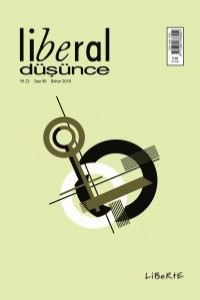Öz
Bu makalede, mülkiyet kavramı siyaset felsefesinde taşıdığı önem bakımından ele alınıp tartışılmıştır. Bu makalenin temel tezi şudur: modern mülkiyet kavramı hukuki sahiplik fikrinden önce, liberal düşünürler tarafından siyasal olarak tanımlanmış ve tarif edilmiştir. Mülkiyet kavramını diğer kavramlardan ayıran temel farklardan birisi mülkiyetin somut bir kavram olmasıdır. Bu bağlamda, mülkiyet kavramı Locke’un ‘emek-değer’ teorisine ve Hume’un ‘sivil toplum’ teorisine dayanarak tartışılmıştır. Mülkiyet kavramı birey, toplum ve devlet arasındaki sosyal ve siyasal ilişkileri düzenlediği ve bireyin özgürlük alanını oluşturduğu için, bu makalede mülkiyet kavramı John Locke’un ve David Hume’un siyaset teorileri esas alınarak karşılaştırmalı olarak analiz edilmiş ve mülkiyetin liberalizm açısından taşıdığı önem açıklanmaya çalışılmıştır.
Anahtar Kelimeler
Kaynakça
- CHERNO, Melvin, “Locke on Property: A Reappraisal”, Ethics, Chicago 1957, Cilt: 68, Sayı: 1, s. 51-55.
- COHEN, Jerry, Lectures on the History of Moral and Political Philosophy, Princeton University Press, New Jersey 2014.
- DAY, J.P, “Locke on Property”, The Philosophical Quarterly, 1966, Cilt: 16 Sayı: 64, s. 207-220.
- HUME, David, “A Treatise of Human Nature, “David Hume: A Treatise of Human Nature” (Second Edition), Oxford 1896.
- LOCKE, John, “Second Treatise of Government”, John Locke: Two Treatises of Government, England 1689.
- MACK, Eric, “The Natural Right of Property”, Social Philosophy and Policy, Sayı: 27, Arizona 2010, s. 53-78.
- NEILSON, Francis, “Locke’s Essays on Property and Natural Law”, The American Journal of Economics and Sociology, 1951, Cilt: 10, Sayı: .3, s. 269-83.
- PANCHIAS, George, “Hume’s Theory of Property”, Hume and Law, ed.: Mackinnon, Ashgate 2012, s. 225-239.
- RAPACZYNSKI, Andrzej, “Locke’s Conception of Property and the Principle of Sufficient Reason” Journal of the History of Ideas, 1981, Cilt: 42, Sayı. 2, s. 305-315.
- RUSSELL, Hardin, David Hume-Moral and Political Theorist, Oxford 2007, s. 144-154.
- WOTTON, David, Modern Political Thought, Hackett Publishing Company, Cambridge M.A 2008.
Öz
This article views the notion of property as one of the essential topics within the scope of modern political philosophy. The main argument of this article is that the notion of modern property has been philosophically shaped prior the existence of the legal ownership. The connection of the property to the modern concepts such as liberty and society plays an essential role in our modern understanding of what property is and what it was. The tangibility of this concept is what makes it different from other notions. Therefore, the main aim of this paper is to review the works of the two important modern political thinkers Locke and Hume and to analyze the origins and theoretical justification behind the notion of property and ownership. This article uses the method of comparison and contrast to grasp a deeper understanding of the key ideas on property written by the two philosophers.
Anahtar Kelimeler
Kaynakça
- CHERNO, Melvin, “Locke on Property: A Reappraisal”, Ethics, Chicago 1957, Cilt: 68, Sayı: 1, s. 51-55.
- COHEN, Jerry, Lectures on the History of Moral and Political Philosophy, Princeton University Press, New Jersey 2014.
- DAY, J.P, “Locke on Property”, The Philosophical Quarterly, 1966, Cilt: 16 Sayı: 64, s. 207-220.
- HUME, David, “A Treatise of Human Nature, “David Hume: A Treatise of Human Nature” (Second Edition), Oxford 1896.
- LOCKE, John, “Second Treatise of Government”, John Locke: Two Treatises of Government, England 1689.
- MACK, Eric, “The Natural Right of Property”, Social Philosophy and Policy, Sayı: 27, Arizona 2010, s. 53-78.
- NEILSON, Francis, “Locke’s Essays on Property and Natural Law”, The American Journal of Economics and Sociology, 1951, Cilt: 10, Sayı: .3, s. 269-83.
- PANCHIAS, George, “Hume’s Theory of Property”, Hume and Law, ed.: Mackinnon, Ashgate 2012, s. 225-239.
- RAPACZYNSKI, Andrzej, “Locke’s Conception of Property and the Principle of Sufficient Reason” Journal of the History of Ideas, 1981, Cilt: 42, Sayı. 2, s. 305-315.
- RUSSELL, Hardin, David Hume-Moral and Political Theorist, Oxford 2007, s. 144-154.
- WOTTON, David, Modern Political Thought, Hackett Publishing Company, Cambridge M.A 2008.
Ayrıntılar
| Birincil Dil | İngilizce |
|---|---|
| Konular | Siyaset Bilimi |
| Bölüm | Araştırma |
| Yazarlar | |
| Yayımlanma Tarihi | 15 Haziran 2018 |
| Gönderilme Tarihi | 12 Nisan 2018 |
| Yayımlandığı Sayı | Yıl 2018 Cilt: 23 Sayı: 90 |


